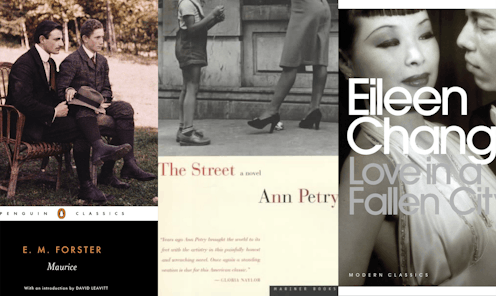Books
5 Classic Novels For People Who Hated 'Of Mice And Men' At School

Every one of us, even the most committed of nerds (pleased to make your acquaintance), entirely despised one of the classic texts on our school reading lists. For me, that was 'The Rime of the Ancient Mariner', a poem about an extremely rude man who ruins a wedding he wasn't even invited to by cornering a guest and telling a horrible story about a bird. Don't let that dissuade you from the literary greats, however: try one of these five classic novels you didn't read in school, then try not to rage at the authors of the curriculum for forcing you to study Lord of the Flies instead.
It should be noted that 'classics' is a rightfully debated category. Too often, the literary canon elevates only white male authors, sidelining seminal texts by women and people of colour in favour of yet another book about desultory rich people. And that goes beyond secondary school reading lists: recently, English Literature students at Cambridge, led by Lola Olufemi, called on the university in an open letter to "re-centre the lives of other marginalized writers who have been silenced by the canon." I've deemed the following books 'classic', therefore, not because they're listed on a syllabus, or because they're shelved under 'Classics' in a bookshop, but because their brilliance, and their significance, truly merits the term.
1'Love in a Fallen City' by Eileen Chang
Love in a Fallen City is an essential component of any short story devotee's library, comprising two short stories and four novellas. Though the collection was published in 2007, after Chang's death, the stories are set in the '30s and '40s, moving between Shanghai and Hong Kong. They take as their subjects the aftermath of World War II in China; the tension between the traditional and the modern; love and family and loss. Chang's heroines are ambitious and resentful and haunted, and her stories will captivate and unsettle.
2'Maurice' by E.M. Forster
It's very possible you've been introduced to Forster through A Room with a View, or through the problematic A Passage to India (criticised by Edward Said amongst others for its Orientalism). Less well known is Maurice, written in the early 20th century but not published until 1971, after Forster's death. The novel follows the titular Maurice Hall from adolescence to adulthood, coming to terms with his sexuality when homosexuality was still criminalised in England. It's a tender, romantic novel about creating a space to be in the face of societal oppression — and it will absolutely make you sob on the tube.
3'The Street' by Ann Petry
Lutie Johnson, a young black woman living in 1940s Harlem and a devoted reader of Benjamin Franklin, believes wholeheartedly in the American dream. She works desperately in the hope of obtaining a better life for herself and her 8-year-old son, Bub, but she's repeatedly thwarted by the degradations of racism, misogyny, and poverty. It's an unjustly overlooked, evocatively written "American classic", as author Gloria Naylor terms it on the cover, and its stark depicton of the multilayered injustices faced by black women remain keenly resonant today.
4'Lady Audley's Secret' by Mary Elizabeth Braddon
Listen: this book is melodramatic and ridiculous, and that's what makes it great. One of the most popular novels of the Victorian "sensation fiction" vogue, Lady Audley's Secret centres on a beautiful high-society newlywed with, well, a secret — and that secret is worthy of an extended Coronation Street storyline. Here's the thing, though: while the book is 100 percent delightfully overwrought and exaggerated capital-letter DRAMA, it's also a pretty astute social commentary on the efforts desperate women once had to go to in order to improve their lot in life. And it's also just really, really fun.
5'Invisible Man' by Ralph Ellison
Ellison's Invisible Man is a visceral narrative of the alienation experienced by an unnamed black narrator because of his race; "I am invisible, understand, simply because people refuse to see me," Ellison writes. To receive a scholarship to university, he must fight other black men to entertain a white audience; he's subjected to electroconvulsive therapy against his will, and later joins then becomes disillusioned with activist group the Brotherhood. Eventually, he retreats underground, where he lives invisibly and alone. Writing in the New Yorker in the wake of Trump's election, Clint Smith called Invisible Man "a parable of our time"; read it urgently, and in awe.
Buy Invisible Man from Waterstones.
There you have it: five classic novels to read, and cherish, and give to all your friends for their next five birthdays. Maybe slide a copy to your teenage niece, too, when she comes home complaining about A Christmas Carol.